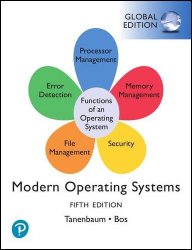Modern Operating Systems, 5th Edition, Global Edition
- Добавил: literator
- Дата: 17-02-2024, 08:50
- Комментариев: 0
 Название: Modern Operating Systems, 5th Edition, Global Edition
Название: Modern Operating Systems, 5th Edition, Global EditionАвтор: Andrew S. Tanenbaum, Herbert Bos
Издательство: Pearson Education
Год: 2024
Страниц: 1185
Язык: английский
Формат: pdf (true)
Размер: 10.1 MB
Authorized adaptation from the United States edition, entitled Modern Operating Systems, 5th Edition, ISBN 978-0-13- 761887-3 by Andrew S. Tanenbaum and Herbert Bos published by Pearson Education 2023.
Modern Operating Systems incorporates the latest developments and technologies in operating systems (OS) technologies. Author Andy Tanenbaum's clear and entertaining writing style outlines the concepts every OS designer needs to master. In-depth topic coverage includes processes, threads, memory management, file systems, I/O, deadlocks, interface design, multimedia, performance tradeoffs, and trends in OS design. Case studies explore popular OS and provide real-world context. Tanenbaum also provides information on current research based on his experience as an operating systems researcher.
A modern computer consists of one or more processors, some amount of main memory, hard disks or Flash drives, printers, a keyboard, a mouse, a display, network interfaces, and various other input/output devices. All in all, a complex system. If every application programmer had to understand how all these things work in detail, no code would ever get written. Furthermore, managing all these components and using them optimally is an exceedingly challenging job. For this reason, computers are equipped with a layer of software called the operating system, whose job is to provide user programs with a better, simpler, cleaner, model of the computer and to handle managing all the resources just mentioned. Operating systems are the subject of this book.
It is important to realize that smart phones and tablets (like the Apple iPad) are just computers in a smaller package with a touch screen. They all have operating systems. In fact, Apple’s iOS is fairly similar to macOS, which runs on Apple’s desktop and MacBook systems. The smaller form factor and touch screen really doesn’t change that much about what the operating system does. Android smartphones and tablets all run Linux as the true operating system on the bare hardware. What users perceive as ‘‘Android’’ is simply a layer of software running on top of Linux. Since macOS (and thus iOS) is derived from Berkeley UNIX and Linux is a clone of UNIX, by far the most popular operating system in the world is UNIX and its variants. For this reason, we will pay a lot of attention in this book to UNIX.
Most readers probably have had some experience with an operating system such as Windows, Linux, FreeBSD, or macOS, but appearances can be deceiving.
The program that users interact with, usually called the shell when it is text based and the GUI (Graphical User Interface) (which is pronounced ‘‘gooey’’) when it uses icons, is actually not part of the operating system, although it uses the operating system to get its work done.
The fifth edition of this book differs from the fourth edition in many ways. There are large numbers of small changes everywhere to bring the material up to date as operating systems are not standing still. For example, where the previous edition focused almost exclusively on magnetic hard disks for storage, this time we give the flash-based Solid State Drives (SSDs) the attention that befits their popularity. The chapter on Windows 8.1 has been replaced entirely by a chapter on the new Windows 11. We have rewritten much of the security chapter, with more focus on topics that are directly relevant for operating systems (and exciting new attacks and defenses), while reducing the discussion of cryptography and steganography.
Chapter 4 changed significantly. We dropped the lengthy descriptions of CD-ROMs and tapes, and instead added sections about SSD-based file systems, booting in modern UEFI-based computer systems, and secure file deletion and disk encryption.
Chapter 10 has been updated with new developments in Linux and Android. Android has evolved considerably since the previous edition, and this chapter covers the current version in detail. This section has been substantially rewritten. Chapter 10 is now quite long and detailed, but UNIX, Linux, and Android fans can learn a lot from it.
Скачать Modern Operating Systems, 5th Edition, Global Edition
Внимание
Уважаемый посетитель, Вы зашли на сайт как незарегистрированный пользователь.
Мы рекомендуем Вам зарегистрироваться либо войти на сайт под своим именем.
Уважаемый посетитель, Вы зашли на сайт как незарегистрированный пользователь.
Мы рекомендуем Вам зарегистрироваться либо войти на сайт под своим именем.
Информация
Посетители, находящиеся в группе Гости, не могут оставлять комментарии к данной публикации.
Посетители, находящиеся в группе Гости, не могут оставлять комментарии к данной публикации.
